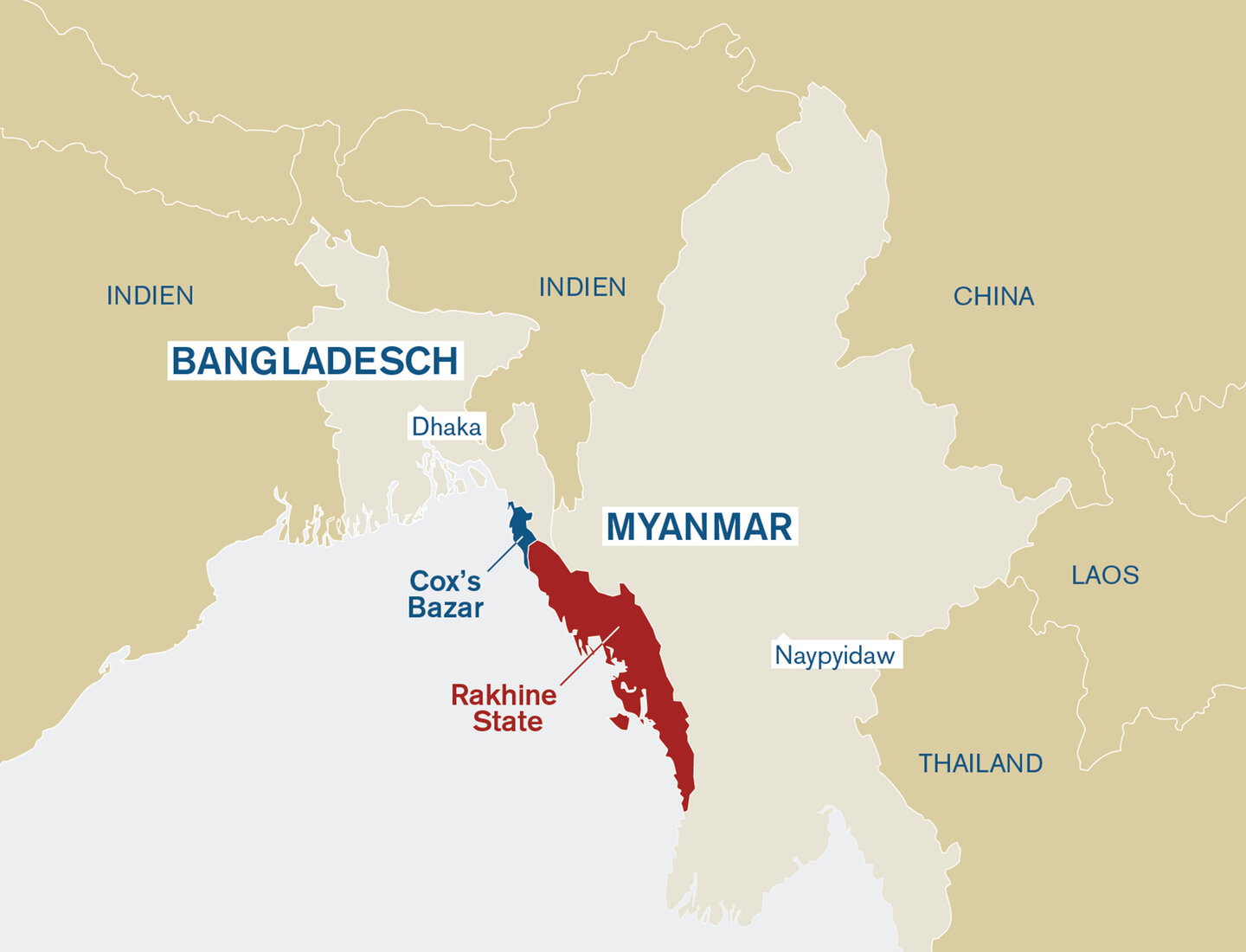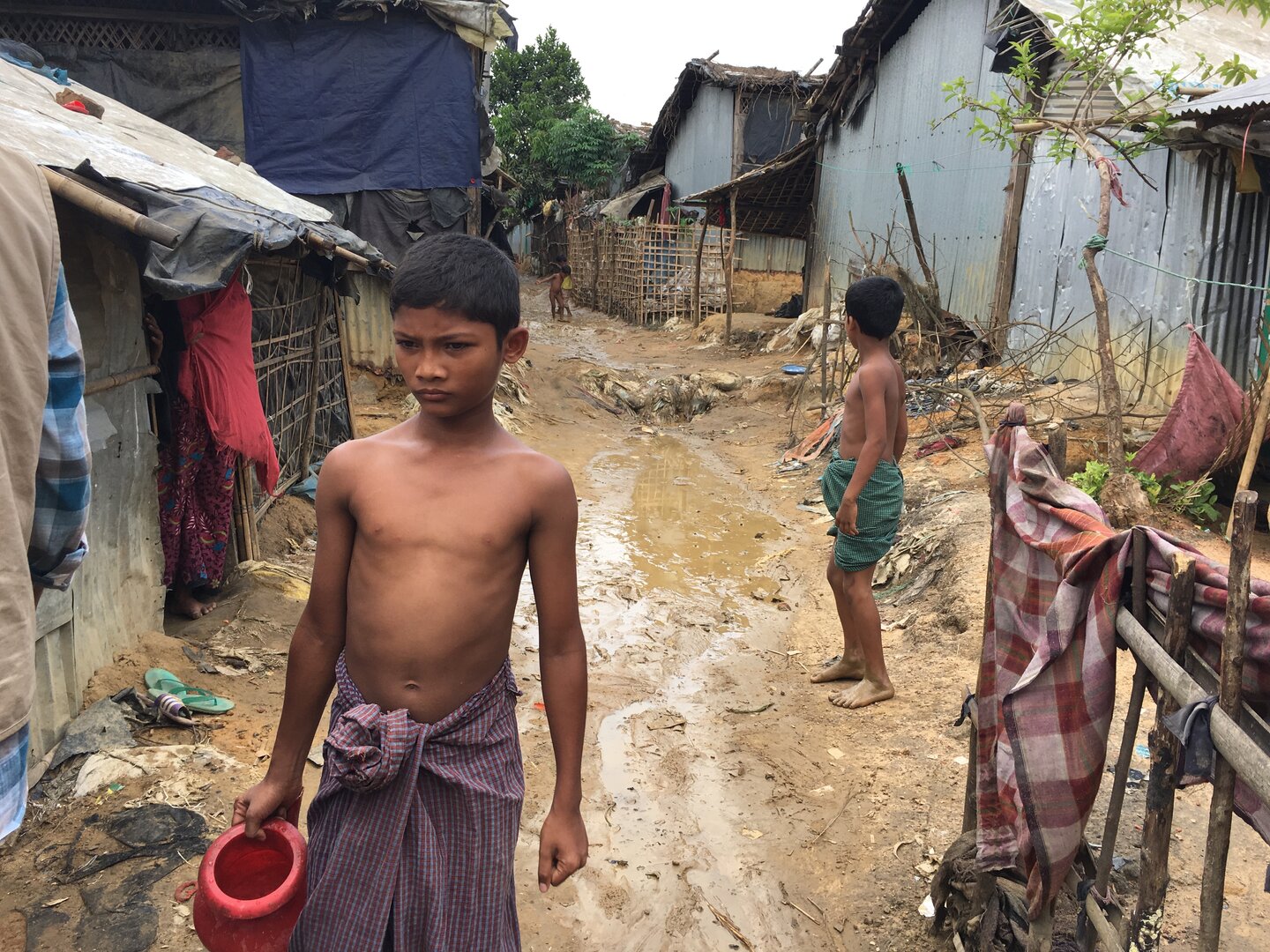On March 5, 2023, fire broke out in three Rohingya refugee camps in Cox's Bazar, Bangladesh. At least 2,000 shelters were destroyed, leaving more than 12,000 people homeless and without their belongings.
In each camp, volunteers who had previously been trained in firefighting were among the first to respond and save lives. The training was organized by Helvetas and Migrant Offshore Aid Station and supported by the World Food Program, Deutsche Gesellschaft für Internationale Zusammenarbeit and UNHCR.
We are currently assessing the extent of the damage and providing assistance to those who have lost everything.
Helvetas has been active in Bangladesh for around 20 years. Since 2017, when hundreds of thousands of Rohingya fled to Bangladesh from neighboring Myanmar, Helvetas has also been providing emergency aid on the ground. The approximately one million refugees are currently particularly threatened by the heavy monsoon rains, which have caused entire rows of huts to slide down. At the same time, the fight against COVID-19 is ongoing.

Biogas from latrines
During the first acute phase of emergency relief, Helvetas distributed hygiene kits. Since then, Helvetas has been active in many different areas in cooperation with local and international partners, for example in providing sanitation, including the construction of 320 latrines which are now used by around 10,000 people. Thanks to a simple conversion unit, the latrines generate biogas which supplies energy predominantly to the communal kitchens.
«This is an important change. Since Helvetas built this kitchen, we haven't had to worry about whether we will be able to find wood for cooking,» explains Nasrin (name changed). «We used to have to walk eight to ten kilometres to look for wood in the hills, or just buy it. We can now buy vegetables and potatoes with the money we've saved.»
The Fight Against COVID-19
The COVID-19 pandemic has exacerbated the already challenging situation. Living in the simplest huts, close together, with few water taps and sanitary facilities, it is hardly possible to keep hygiene and distance rules. Medical care is also not ideal, isolation and quarantine are hardly possible. Helvetas is supporting around 160,000 Rohingya and locals living in the villages next to the camps in their fight against COVID-19:
- Information, education and prevention: Helvetas has trained Rohingya volunteers to educate the population about the disease, its causes, symptoms, transmission routes and prevention measures so that people are informed in their own language and there is no risk of infection from outsiders. They distribute leaflets with easy-to-understand rules of conduct.
- Distribution of emergency hygiene articles: Helvetas also distributes vouchers for hygiene kits via Rohingya volunteers. These kits contain the most basic necessities: a 20-litre bucket, a 1.5-litre container for water, soap with a soap dish, disinfectant and powder for making a disinfectant solution. The refugees can pick up the material at reference points where they can also get food.
- Distribution of seeds and emergency financial aid: Helvetas has provided seed and financial aid to families in particular need.
- Improving sanitation facilities: Helvetas has helped to improve hygiene and sanitation from the very beginning and helped to build latrines. Now the NGO has ensured that health posts in the camp have hand washing stations, soap and disinfectant, and that heavily frequented places have hand washing stations.
Preparing for monsoon season
The Helvetas project, which is supported by the independent charity Swiss Solidarity, not only helps to improve the health of refugees, it also promotes environmental protection, as families no longer have to search for wood, which was becoming increasingly scarce. Moreover, the sanitation facilities, combined with hygiene courses, are preventing drinking water from being contaminated by faeces and diseases like cholera from spreading.
Helvetas is responsible for administering three camps with a total of 100,000 refugees on behalf of UNHCR. The aim is to improve the transmission of information between the communities and the different organisations represented in the camps in order to ensure that the relief measures have maximum impact. On the infrastructure side, Helvetas is making preparations for monsoon season and maintenance. This includes helping refugees who were living in particularly at-risk areas to move to safer locations.
Safety of women and children
Helvetas also champions the safety of women and children. Committees for women, young people and religious leaders were set up to ensure a better flow of information between communities and the humanitarian organisations on the ground. Their task is to relay important information from other women living in their area.
Women talk in meetings about issues such as domestic violence or difficulties related to their periods – for example, where they can dry their sanitary towels discretely, given the lack of space in their shelters. «The participants have the opportunity here to learn something new and to find out about subjects they have perhaps never spoken about or know nothing about. In one of these workshops, the participants discussed their menstrual cycle. They had no idea how the biological process works but were very curious and keen to learn,» explains Mostafa, who is responsible for coordinating safety measures on the ground, and who also trains the volunteers.
Support for vegetable growing
With the support of Swiss Solidarity, Helvetas is helping refugee families to grow their own vegetables on top of and next to their huts. This improves the refugees' food supply and is a step towards reducing their dependence on humanitarian aid. The project also involves local families, who have welcomed the refugees with open arms, as it is important to prevent conflict.
Since the camp has grown extremely rapidly, and unchecked, some essential groundwork is required: on behalf of UNICEF, Helvetas is mapping the camp. The educational needs of the Rohingyas must be identified, for example.

Helvetas will continue to advocate for the protection of the weakest and most vulnerable people against dangers such as human trafficking, sexual violence and poor hygiene. The women's committees have already chosen the discussion topics for their workshops in 2019. These include non-violent communication, human rights and nutrition.








